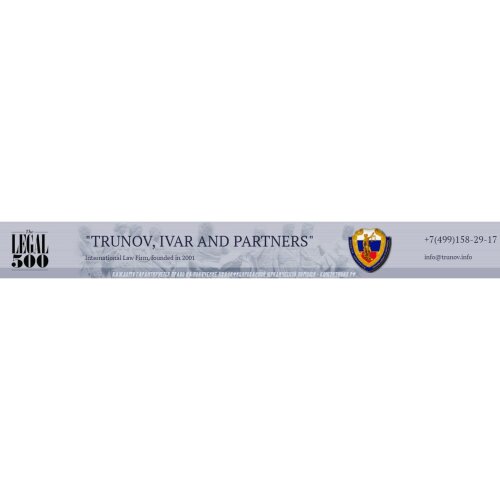Best Constitutional Law Lawyers in Russia
Share your needs with us, get contacted by law firms.
Free. Takes 2 min.
Or refine your search by selecting a city:
List of the best lawyers in Russia
About Constitutional Law in Russia
Constitutional Law in Russia is the body of law which defines the relationship between different entities within a state, namely, the executive, the legislature, and the judiciary. It is a fundamental area of law that governs the principles and structures of governmental institutions, ensuring the protection of human rights and civil liberties of individuals. The Russian Constitution, adopted on December 12, 1993, is the supreme law of the Russian Federation and provides the framework within which laws and authorities operate. It defines Russia as a democratic, federal law-governed state with a republican form of government.
Why You May Need a Lawyer
There are several scenarios in which an individual might seek legal advice in the realm of Constitutional Law in Russia. These include, but are not limited to, violations of constitutional rights, disputes relating to the separation of powers, challenges to the constitutionality of legislation or executive actions, and issues related to federal structure and local governance. Individuals or organizations may require legal assistance to navigate laws that may conflict with constitutional provisions, to challenge governmental actions, or when facing potential human rights violations.
Local Laws Overview
The Russian Constitution is the primary source of Constitutional Law in Russia, providing extensive rights and freedoms to its citizens. Key aspects include the establishment of a federal structure, the separation of powers among the legislative, executive, and judicial branches, and the recognition of human rights. Important features cover the right to privacy, freedom of speech, the right to a fair trial, and protection against discrimination. The Constitution outlines the powers between federal and local entities, maintaining the balance of authority across regions. Furthermore, amendments to the Constitution can profoundly influence local laws, with significant changes having occurred over recent years.
Frequently Asked Questions
What is the role of the Russian Constitutional Court?
The Constitutional Court of the Russian Federation is the highest judicial body responsible for interpreting the Constitution. It reviews whether federal laws, presidential decrees, and other legal provisions are consistent with the Constitution.
Can a law be challenged for being unconstitutional in Russia?
Yes, individuals and entities can challenge the constitutionality of laws and legal acts if they believe these violate constitutional rights. Such cases may be brought before the Constitutional Court.
What are the basic human rights protected by the Russian Constitution?
Basic rights include the right to freedom of speech, assembly, religion, privacy, and protection against arbitrary detention, among others. The Constitution guarantees these rights to all citizens.
How are constitutional rights enforced in Russia?
Constitutional rights are enforced through the judiciary, including the Constitutional Court. Individuals can seek redress through legal proceedings if their rights are violated.
What major amendments have been made to the Russian Constitution?
Significant amendments were made in 2020, impacting presidential term limits, sovereignty issues, and governance structures, among others. These amendments continue to influence Russian Constitutional Law.
How does the Constitution address the separation of powers?
The Constitution establishes a federal structure with a clear separation of powers among the executive, legislative, and judicial branches to ensure checks and balances within the government.
Are regional laws subject to the Russian Constitution?
Yes, regional laws must comply with the Russian Constitution, which is the supreme legal authority. Federal law takes precedence over regional legislation in case of conflicts.
What is the process for amending the Russian Constitution?
The process involves approval from both houses of the Federal Assembly, and in some cases, a nationwide referendum may be required for significant changes.
What role do federal entities have under the Constitution?
The Constitution delineates the division of powers between federal and regional governments, granting certain powers exclusively to the federation and others to regional authorities.
How can individuals participate in constitutional proceedings?
Individuals may petition the Constitutional Court if they believe their constitutional rights have been infringed, and they can participate in public hearings related to constitutional amendments or issues.
Additional Resources
For those seeking further information or assistance in Constitutional Law, the following resources may be helpful:
- The Constitutional Court of the Russian Federation: The official site provides information on court rulings and constitutional provisions.
- The Russian Federation State Duma: Offers legislative updates and information on policymaking relevant to Constitutional Law.
- Local Law Libraries and Legal Centers: Public and university libraries often provide access to legal texts and resources.
- Human Rights Organizations: These can offer guidance and support for issues related to constitutional and human rights.
Next Steps
If you require legal assistance in Constitutional Law in Russia, consider taking the following steps:
- Identify your specific legal issue and gather any relevant documents or evidence.
- Consult with a qualified legal professional who specializes in Constitutional Law to get tailored advice.
- Consider reaching out to legal aid organizations if you need assistance in finding a lawyer.
- Stay informed on constitutional developments and any changes to the legal landscape that could affect your case.
- If necessary, prepare to engage in formal legal proceedings, ensuring you understand the process and your rights.
Lawzana helps you find the best lawyers and law firms in Russia through a curated and pre-screened list of qualified legal professionals. Our platform offers rankings and detailed profiles of attorneys and law firms, allowing you to compare based on practice areas, including Constitutional Law, experience, and client feedback.
Each profile includes a description of the firm's areas of practice, client reviews, team members and partners, year of establishment, spoken languages, office locations, contact information, social media presence, and any published articles or resources. Most firms on our platform speak English and are experienced in both local and international legal matters.
Get a quote from top-rated law firms in Russia — quickly, securely, and without unnecessary hassle.
Disclaimer:
The information provided on this page is for general informational purposes only and does not constitute legal advice. While we strive to ensure the accuracy and relevance of the content, legal information may change over time, and interpretations of the law can vary. You should always consult with a qualified legal professional for advice specific to your situation.
We disclaim all liability for actions taken or not taken based on the content of this page. If you believe any information is incorrect or outdated, please contact us, and we will review and update it where appropriate.
Browse constitutional law law firms by city in Russia
Refine your search by selecting a city.
















